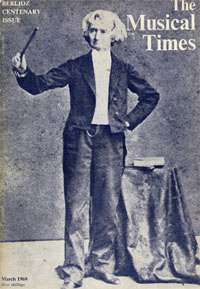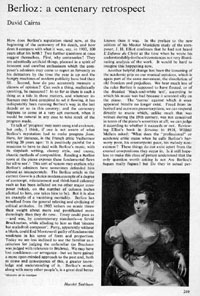
![]()
By
David Cairns
© 1969, 2009 David Cairns
Published in
The Musical Times, Berlioz Centenary issue, March 1969, pp. 249-251![]()

 |
By David Cairns © 1969, 2009 David Cairns Published in The Musical Times, Berlioz Centenary issue, March 1969, pp. 249-251 |
 |
I have no recollection of writing this article, though I see that some of its ideas, and in one or two cases, words, went into the first volume of my biography of Berlioz. If the article’s final paragraph now seems unduly defensive, that is a measure of the change that the last 40 years have seen in Berlioz’s reputation.
David Cairns
17 June 2009
![]()
David Cairns
How does Berlioz’s reputation stand now, at the beginning of the centenary of his death, and how does it compare with what it was, say, in 1903, 100 years after his birth? Two further questions at once suggest themselves. First, why centenaries? They are admittedly artificial things, planned in a spirit of innocent and carefree enthusiasm which the composer’s admirers may come to regret as fervently as his detractors by the time the year is up and the hungry machines of modern publicity have had their fill. Second, how do you accurately measure a climate of opinion? Can such a thing, realistically speaking, be measured? In so far as there is such a thing as a tide in these matters, and whatever influences may have conspired to set it flowing, it has indisputably been running Berlioz’s way in the last decade or so in this country; and the centenary happens to come at a very apt moment, when it would be natural in any case to take stock of the progress made.
To talk of ‘progress’ may seem smug and cocksure, but only, I think, if one is not aware of what Berlioz’s reputation had to make progress from. Here, for instance, is the French critic Vuillermoz writing 20 years ago: ‘It is positively painful for a musician to have to deal with Berlioz’s music, with its slapdash writing, clumsy style, and messy, chaotic methods of composition. Reading a Berlioz score at the piano exposes these fundamental flaws for all to see’.1 This sort of venom may explain why Berlioz’s admirers have sometimes defended him almost as intemperately. The Berlioz article in the current Grove is a choice modern example of a degree of contempt, misstatement and third-hand calumny such as has been inflicted on no other major composer (which, on the number of column inches allotted to him, one takes him to be). But it is also an example of a vanishing mentality. Berlioz has benefited from the general relaxing and civilizing of critical attitudes. In 1903 writers on music threw their weight about more and pontificated more damningly than they do now. Tovey could pass as — and was, by contemporary standards — a fervid Brucknerian, while alluding to him as that ‘sincere but maladroit composer’. Parry, apparently without a blush, could find Monteverdi guilty of fundamental weakness in his sense of form and proportion. Today we are less inclined to use the familiar as a criterion for judging the unfamiliar (as Bruckner was judged with reference to Brahms). We may have lost confidence — or arrogance — but we have gained a more open-minded approach to the past and, both as cause and consequence of this, a greater knowledge and understanding of it. Berlioz’s music, along with many other people’s, is a great deal better known than it was. In the preface to the new edition of his Master Musicians study of the composer, J. H. Elliot confesses that he had not heard L’Enfance du Christ at the time when he wrote his understandably-in-the-circumstances not very illuminating analysis of the work. It would be hard to imagine this happening now.
Another helpful change has been the loosening of the academic
grip on our musical opinions, which is again part of the same movement, the
dissolution of old frontiers and prejudices. We hear much less of the rules
Berlioz is supposed to have flouted, or of the dreaded ‘black-and-white test’,
according to which his music was bad because it sounded silly on the piano. The
‘norms’ against which it once appeared bizarre no longer exist. Freed from
inherited and outworn preconceptions, we can respond directly to music which,
unlike much that was written during the 19th century, was not conceived in terms
of the piano’s sonorities at all; we can judge it according to whether it
succeeds or not. Reviewing Elliot’s book in Scrutiny in 1938, Wilfrid
Mellers asked: ‘What does the “professional” or academic critic mean
when he calls Berlioz’s harmony poor, his counterpoint poor, his melody
non-existent? These things do not exist apart from the created compositions they
occur in. Is it still hopeless to make this class of person understand that the
only question worth asking is not Are Berlioz’s fugues really fugues? but Do
they in actual performance come off?’2
30 years later one may perhaps claim with reasonable confidence that his
plea has been answered. If that class of person has not changed his opinion, at
least it does not colour the general attitude. It is possible to take Berlioz
seriously without exciting comment. The dust has almost settled. He has ceased
to be a special case. Indeed, if one had read only the chapter on Berlioz in
Mellers’s Man and his Music (1960), which anticipates the present
acceptance of his music, one would hardly know there had ever been such a thing
as a ‘Berlioz Case’; gone is the sport of musical history, the unique
phenomenon springing up from nowhere and leading nowhere. This view used to be
accepted even by his partisans. Harty, for example, a famous Berlioz conductor
between the wars, held that one could not listen to him as one listened to other
composers: he required, so to speak, an entirely separate set of ears, a special
attitude of mind. I suspect that the musical generation that has grown up since
the last war would not understand what he meant; they either like Berlioz’s
music or they don’t (by the same token, the ‘Berlioz maniac’ may be
himself a dying breed, left stranded by an evolutionary process which no longer
needs him).
Berlioz’s fugues really fugues? but Do
they in actual performance come off?’2
30 years later one may perhaps claim with reasonable confidence that his
plea has been answered. If that class of person has not changed his opinion, at
least it does not colour the general attitude. It is possible to take Berlioz
seriously without exciting comment. The dust has almost settled. He has ceased
to be a special case. Indeed, if one had read only the chapter on Berlioz in
Mellers’s Man and his Music (1960), which anticipates the present
acceptance of his music, one would hardly know there had ever been such a thing
as a ‘Berlioz Case’; gone is the sport of musical history, the unique
phenomenon springing up from nowhere and leading nowhere. This view used to be
accepted even by his partisans. Harty, for example, a famous Berlioz conductor
between the wars, held that one could not listen to him as one listened to other
composers: he required, so to speak, an entirely separate set of ears, a special
attitude of mind. I suspect that the musical generation that has grown up since
the last war would not understand what he meant; they either like Berlioz’s
music or they don’t (by the same token, the ‘Berlioz maniac’ may be
himself a dying breed, left stranded by an evolutionary process which no longer
needs him).
All this has happened for two main reasons. First, the historical factors which made Berlioz seem a freak have run their course; the characteristics which set him so widely and disconcertingly apart from his age — melodic generation of form, linear approach to orchestration, conciseness of utterance, harmonic short-cuts, rhythmic variety, a quality of classical impersonality even in his most passionate flights, and a Protean diversity of output in which no one work prepares us for any of the others — have lost their strangeness. Second, we have had more opportunities to hear his music (partly because, whether by pure chance or in response to the Zeitgeist, there are more impresarios and conductors who want to perform it). We simply know it better — and there is nothing like knowledge for broadening understanding, just as there is nothing like ignorance for making one think one knows. Here the single most important event has been the discovery of The Trojans. The Trojans, before people knew it, summed up the Berlioz problem in all its thorny enormity. It was Berlioz’s supreme white elephant. It lasted eight hours (it still does in Oper der Welt). It was unstageable. It was really three operas reduced to one hopelessly unwieldy monster (P. H. Lang). It contained ‘pages of monotonous, uninspired and mortally fatiguing music’ (Elliot). Ernest Newman himself, later a convinced champion of the work, based a large part of the argument in his brilliant early essay ‘Berlioz, Romantic and Classic’3 on the supposition that the composer — ‘a pathetic monument of incompleteness’ — suffered a serious decline in creative vitality in the second half of his career, as proved, in particular, by the fact that ‘in much of the music of Les Troyens there are only too many signs of physical and mental exhaustion’. (Even Newman’s Opera Nights occasionally commits the sort of mistake that is a hangover from the common old idea that Berlioz did not really know what he was doing.4)
The effect of the Covent Garden performances in 1957 was revelatory. The work — ‘one of the most gigantic and convincing masterpieces of music-drama’ (Tovey) — illuminated every aspect of Berlioz’s art, of which it emerged, after nearly a century of partial obscurity, as the culmination and vindication. At a stroke the whole picture changed. Typical, I think, is the case of a musician of impeccably Germanic musical upbringing who, he recalls, went to the first night in a spirit of no more than mild curiosity and came out at the end with one thought in his head: When can I hear this music again? From that moment he saw the whole of Berlioz’s music in a new light. As Robert Collet foresaw at the time, ‘What seems immediately to have struck many people . . . was that this music was utterly different from the idea of Berlioz handed out to us by most writers on music. . . . Until very recently it was customary to hear quite knowledgable musicians and amateurs talk of Berlioz as a wayward Byronic eccentric, with an interest in the orchestra that was unusual for his day, and an undoubted gift for musical grotesquerie, but otherwise a striking figure in musical history rather than a truly great composer. No one who has listened to The Trojans with even partial understanding can accept such a superficial and one-sided view any longer. The Covent Garden production should bring about a fundamental change in the attitude of the musical public to Berlioz’s work as a whole’. 5
It is safe to say — at any rate at the outset of the centenary celebrations — that Berlioz’s music is more highly regarded and widely accepted here than ever before. There will always be people who remain resistant to its appeal, finding it perplexing, uncomfortable, or unconvincing. This is bound to be so, but perhaps more in the case of Berlioz than of most composers, because of a kind of electrical atmosphere in his music, by which some people are disagreeably affected as by certain kinds of weather. For the rest of us, what is the nature of its appeal? What does one find in it? Just because it is, for the most part, emphatically not programme music in the pejorative sense (that is, music in which the extra-musical idea is not fully absorbed), this is very difficult to put into words that do more than express one’s personal reaction. Like all great music, overtly dramatic music included, it has an independent, self-sufficient life of its own. It is, and there is really nothing more to be said. The haunting quality of a melody like ‘Le spectre de la rose’, the power of those great extended melodic paragraphs that his works, particularly his later works, are full of, cannot be analysed. To my mind Victor Gollancz hit on one aspect of it with remarkable perceptiveness when he wrote of ‘an ache for an earlier, a kind of pre-moral beauty’.6 Mellers expresses it similarly: ‘In all Berlioz’s most characteristic music, particularly in Les Troyens and the Requiem, there is this vision of heroic and majestic dignity combined with that singular inimitable piquancy in the Berliozian melody — a peculiarly acrid sense of bitterness and loss’.7 This sense of nostalgia for a state of innocence clearly glimpsed but recognized to be unattainable suffuses his music. It is part of a profound feeling of antiquity, of which the frequent modal inflexions and stepwise movement of melody are only one of the secrets. He holds out to us a vision of human nobility, of a possibility of grandeur, but without illusions. He is a romantic who has something ‘classical’ to tell us. He understands the tragic limitations and burdens of human life, the discrepancy between the dream and the reality, the terror of loneliness and death. He is an aristocrat of the feelings; he objectifies his emotions. He intoxicates the imagination rather than the senses. His style, with its wiry clarity, rhythmic energy, vivid timbres and violent contrasts, may sometimes irritate or embarrass, but rarely if ever cloys or sates.
It is sometimes hard, when one feels close to a composer, to separate the wheat from the chaff in his work; yet just because one wants him to live up to his best, one listens if anything more critically to him than to other composers. Certainly some of Berlioz’s most fascinating works must be judged problematical — full of endless delights but, as satisfactory wholes, touch and go in practice. Certainly he is uneven, but not significantly more so than Wagner or Verdi; I believe that when you know him well, his lapses — when they are not in fact the result of unidiomatic performance (admittedly not a difficult thing to achieve in such precisely calculated music) — are no more than you would expect to find in a romantic composer committed to the rewarding but hazardous path of dramatic, expressive music, who tries to make music do as much as Berlioz does. It is a sign that the old days of embattled controversy have given way to something more peaceful that one can freely admit the bad in Berlioz. The good at last seems assured of acceptance. The centenary has fulfilled his humorous prophecy — made at a time when reports of performances abroad were consoling him for Parisian indifference — that if he could ‘only live to be a hundred and fifty, his musical life would become decidedly interesting’.
____________________________
1. Histoire de Ia musique ![]()
2. June, pp.119-28 ![]()
3. Musical Studies (1903) ![]()
4. eg the odd statement that the audience are expected
somehow to know, from their Virgil, that in Act 4 Ascanius is being impersonated
by Cupid.![]()
5. The Score, July 1957 ![]()
6. Journey towards Music ![]()
7. Scrutiny, ibid ![]()
![]()
* We are most grateful to Mr David Cairns
for granting us permission to reproduce this article and for writing an introduction to it. We have transcribed the text of the article from The Musical Times, March 1969, a copy of which is in our collection.![]()
![]()
The Hector Berlioz Website was created by Monir Tayeb and Michel Austin on 18 July 1997; this page created on 1 July 2009.
© Monir Tayeb and Michel Austin. All rights of reproduction reserved.
![]() Back to Original Contributions page
Back to Original Contributions page
![]() Back to Home Page
Back to Home Page
![]() Retour à la page Contributions Originales
Retour à la page Contributions Originales
![]() Retour à la Page d’accueil
Retour à la Page d’accueil